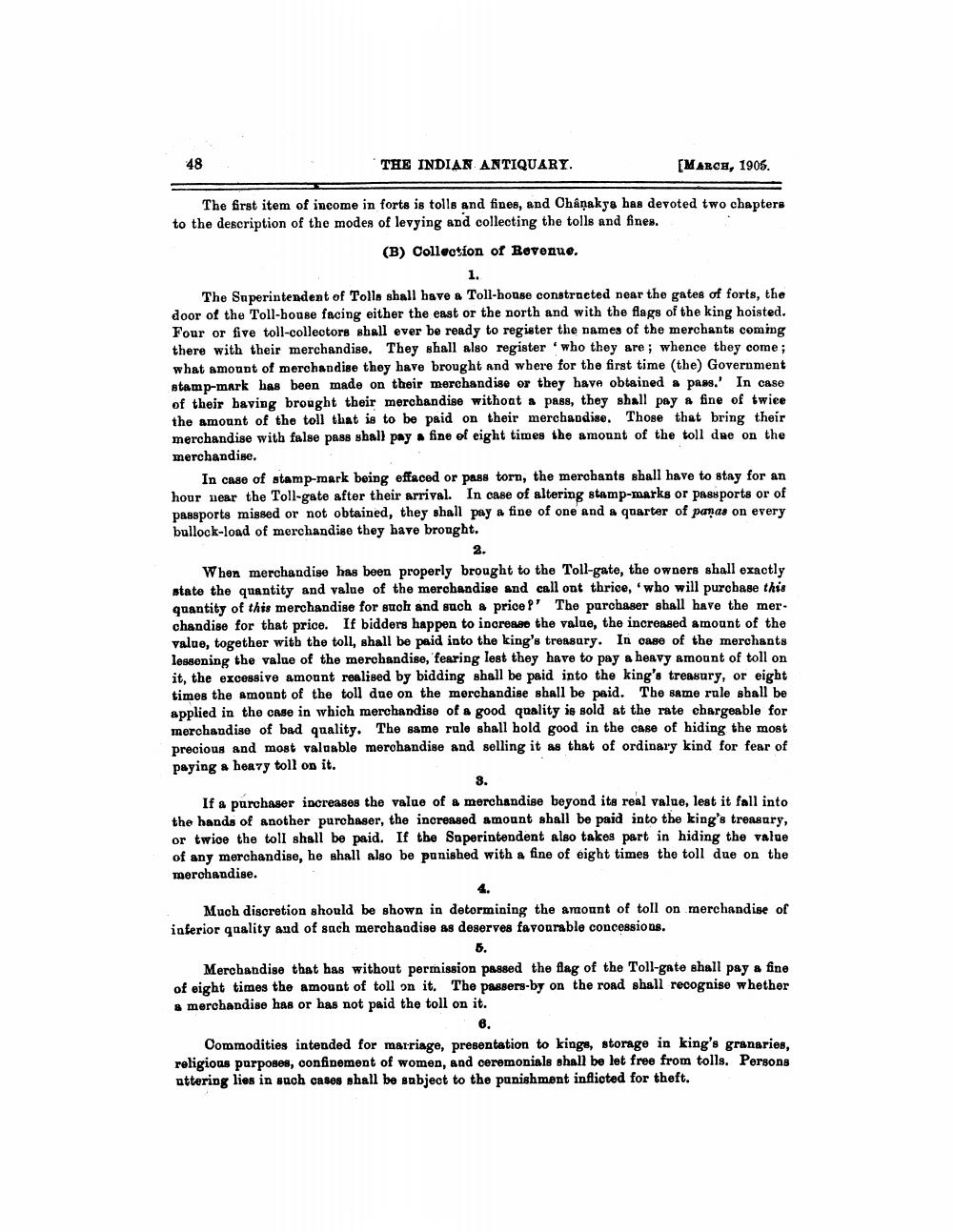________________
48
THE INDIAN ANTIQUARY.
[MARCH, 1905.
The first item of income in forts is tolls and fines, and Chanakya has devoted two chapters to the description of the modes of levying and collecting the tolls and fines.
(B) Collection of Revenue.
1.
The Superintendent of Tolls shall have a Toll-house constructed near the gates of forts, the door of the Toll-house facing either the east or the north and with the flags of the king hoisted. Four or five toll-collectors shall ever be ready to register the names of the merchants coming there with their merchandise. They shall also register who they are; whence they come ; what amount of merchandise they have brought and where for the first time (the) Government stamp-mark has been made on their merchandise or they have obtained a pass.' In case of their having brought their merchandise without a pass, they shall pay a fine of twice the amount of the toll that is to be paid on their merchandise. Those that bring their merchandise with false pass shall pay a fine of eight times the amount of the toll due on the merchandise.
In case of stamp-mark being effaced or pass torn, the merchants shall have to stay for an hour near the Toll-gate after their arrival. In case of altering stamp-marks or passports or of passports missed or not obtained, they shall pay a fine of one and a quarter of panas on every bullock-load of merchandise they have brought.
2.
When merchandise has been properly brought to the Toll-gate, the owners shall exactly state the quantity and value of the merchandise and call ont thrice, 'who will purchase this quantity of this merchandise for such and such a price?' The purchaser shall have the merchandise for that price. If bidders happen to increase the value, the increased amount of the value, together with the toll, shall be paid into the king's treasury. In case of the merchants lessening the value of the merchandise, fearing lest they have to pay a heavy amount of toll on it, the excessive amount realised by bidding shall be paid into the king's treasury, or eight times the amount of the toll due on the merchandise shall be paid. The same rule shall be applied in the case in which merchandise of a good quality is sold at the rate chargeable for merchandise of bad quality. The same rule shall hold good in the case of hiding the most precious and most valuable merchandise and selling it as that of ordinary kind for fear of paying a heavy toll on it.
3.
If a purchaser increases the value of a merchandise beyond its real value, lest it fall into the hands of another purchaser, the increased amount shall be paid into the king's treasury, or twice the toll shall be paid. If the Superintendent also takes part in hiding the value of any merchandise, he shall also be punished with a fine of eight times the toll due on the merchandise.
Much discretion should be shown in determining the amount of toll on merchandise of inferior quality and of such merchandise as deserves favourable concessions.
5.
Merchandise that has without permission passed the flag of the Toll-gate shall pay a fine of eight times the amount of toll on it. The passers-by on the road shall recognise whether a merchandise has or has not paid the toll on it.
6.
Commodities intended for marriage, presentation to kings, storage in king's granaries, religious purposes, confinement of women, and ceremonials shall be let free from tolls. Persons uttering lies in such cases shall be subject to the punishment inflicted for theft.




